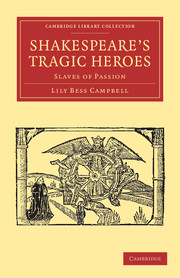CHAPTER THIRTEEN
Othello: A Tragedy of Jealousy.
Published online by Cambridge University Press: 07 September 2010
Summary
Othello has suffered less in its modern interpretation than any other of Shakespeare's tragedies, it would seem. So insistently did Shakespeare keep this tragedy unified about the theme of jealousy and the central victims of the passion, so obviously did he mould his plot about the black Moor and the cunning Iago and the victims of their jealousy that no interpreter has been able to ignore the obvious intention of the author. Yet if we study the contemporary interpretations of the passion here portrayed, we find that Shakespeare was following in detail a broader and more significant analysis of the passion than has in modern days been understood. The play is, however, clearly a study in jealousy and in jealousy as it affects those of different races.
Jealousy was, in the thinking of the Renaissance, not one of the simple or elementary passions but a derivative or compounded passion. It is a species of envy, which is in turn a species of hatred. Hatred finds its opposite in love and is opposed to love. Envy is opposed to mercy. Yet while jealousy is opposed to love, it rises often from love. And like envy it has something of the grief or fear that comes from seeing another in possession of that which we would possess solely for ourselves, or from fearing that another may possess it. It is this curious mingling of love and hatred with grief or fear that we see in jealousy.
- Type
- Chapter
- Information
- Shakespeare's Tragic HeroesSlaves of Passion, pp. 148 - 174Publisher: Cambridge University PressPrint publication year: 2009First published in: 1930



